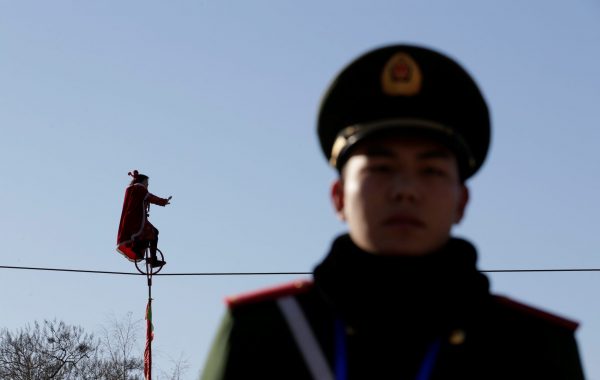The benefit of this was simple: to make China’s life easier by informing people what it was intending and how this was to be in everyone’s interest. As ever, things proved more complicated than that.
Since 2013, China has never enjoyed a higher profile, nor has it been more carefully watched by the outside world. It is now facing a deepening quandary. It wants to be seen as important and powerful. But it also wants to avoid being regarded by the United States as a threat. It is these two issues that Xi addressed in his speech on ‘major-country diplomacy with Chinese characteristics’ to the Central Conference on Work Relating to Foreign Affairs on 23 June 2018. Make no mistake about it: ‘major country’ is the description that in this context best fits China. This gives it parity with the only other contender that has the right to use this title — the United States.
According to the Xinhua report of the speech — attended by all members of the Politburo Standing Committee — there were two key themes: ‘focussing on realising the Chinese nation’s rejuvenation and promoting human progress and making contributions to the building of a community with a shared future for humanity.’
For the first part, China’s rejuvenation is a reference to the Party’s second centennial goal of fully developing the nation prior to 2049 (when the Party celebrates its hundredth year in power). It is intended to be a symbolic moment where the Communists can say that, for the first time in modern history, China can stand secure, strong and respected as a major power once more. This is intended to be the final resolution to the ‘century of humiliation’ narrative where China was colonised and divided by outsiders. Under Xi, the message can go inside and outside the country loud and clear — its moment of restoration has arrived and never again will it be bullied. This is the nationalistic, emotionally mobilising narrative that sustains the Xi style of politics.
The second idea being promoted is that what is happening is good not just for China but for the whole world. China, in its own unique way, is seeking a non-hegemonistic, collaborative way to be part of the international community. Chinese leaders want the outside world to accept the message that China does not seek to usurp or duplicate the United States. It is just doing things its own way and, as it does so, China is contributing to shared issues like sustainability, free trade and global prosperity to show that it is a true stakeholder in shared issues. China’s just rise is good for China — but also for humanity. That at least is what Chinese leaders want the outside world to accept as their key message.
The tension in the language of Chinese foreign policy between the nationalistic tone invoked domestically and the attempt to craft a more friendly and appealing external language that the rest of the world can embrace has been present since China’s reform and opening began. The only difference is that the tension has grown sharper. It is as though the more China has become prominent and the larger its economy has grown, the more there is a disjunct between the jubilant image of the ‘Chinese Dream’ and an era of China’s power and dominance. This is not to mention the hackles that this creates in the region and across the rest of the world as people fear what the impact of China’s rise might be.
What is certain is that Xi’s China cannot pretend it is not a major power. Any attempt to do so would be untrue and insincere. Even in the diplomatic persona of Xi we see a country that seeks status, looks more confident and is aware of the prowess that its material wealth has brought to it.
For all the confidence that using a term like ‘major-country diplomacy’ might betray, there is underlying it a pragmatic acceptance by the country’s leaders of the limits of China’s power. They know that China is part of an interconnected global economic and geopolitical network. They are also aware that the country continues to have massive domestic issues it needs to handle — demographic, environmental and social — and that it is depends on a stable global framework to be able to focus on them. With the appearance of Donald Trump, the rest of the world is starting — to China’s chagrin — to become a problematic and unstable place.
‘Major-country diplomacy’ was always a major balancing act. The question is whether China is able to maintain the current delicate posture between contesting domestic and external demands — or whether it will be pulled decisively in one particular direction. Xi’s speech makes it clear that at least at the moment he wants the balance to continue.
Kerry Brown is Professor of Chinese Studies and Director of the Lau China Institute at King’s College London. His China’s Dream: The Culture of the Communist Party of China and Its Secret Sources of Power will be published by Polity Press, Cambridge in September.

